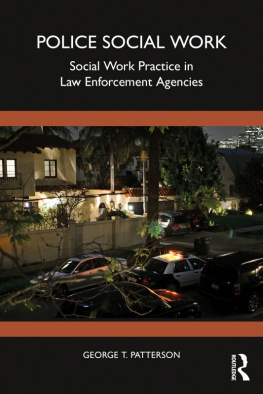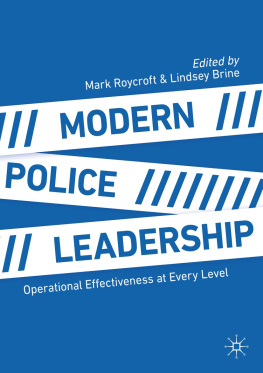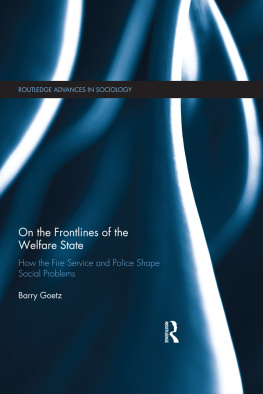
Policing in an Age of Austerity
Policing in an Age of Austerity uniquely examines the effects on one key public service: the state police of England and Wales. Focusing on the major cutbacks in its resources, both in material and in labour, it details the extent and effects of that drastic reduction in provision together with related matters in Scotland and Northern Ireland. This book also investigates the knock-on effect on other public agencies of diminished police contribution to public well-being.
The book argues that such a dramatic reduction in police services has occurred in an almost totally uncoordinated way, both between provincial police services, and also with regard to other public agencies. While there may have been marginal improvements in effectiveness in certain contexts, the British police have dramatically failed to seize the opportunity to modernize a police service that has never been reformed to suit modern exigencies since its date of origin in 1829. British policing remains a relic of the past despite the mythology by which it increasingly exports its practices and officers to (especially) transitional societies.
Operating at both historical and contemporary levels, this book furnishes a mine of current information. Critically, it also emphasizes the extent to which British policing has traditionally concentrated on the lowest socio-economic stratum of society, to the neglect of the policing of the more powerful. Policing in an Age of Austerity will be of interest to academics and professionals working in the fields of criminal justice, development studies, and transitional and conflicted societies, as well as those with an interest in the social schisms caused by the current financial crisis.
Mike Brogden is Honorary Professor in the Department of Applied Social Sciences at the University of Lancaster. He has served as an advisor to several governments on policing matters, and inter alia, served as EU Security Advisor for the first democratic election of 1994 in South Africa.
Graham Ellison is Senior Lecturer in Criminology, School of Law, Queen's University, Belfast. He has been a Senior International Expert to the United Nations Development Programme (UNDP) in Turkey in respect of the civilian oversight of the police there.
Policing in an Age of Austerity
A postcolonial perspective
Mike Brogden and Graham Ellison
First published 2013 by Routledge
2 Park Square, Milton Park, Abingdon, Oxon, OX14 4RN
Simultaneously published in the USA and Canada
by Routledge
711 Third Avenue, New York, NY 10017
Routledge is an imprint of the Taylor & Francis Group, an informa business
2013 Mike Brogden and Graham Ellison; individual chapters, the contributors
All rights reserved. No part of this book may be reprinted or reproduced or utilized in any form or by any electronic, mechanical, or other means, now known or hereafter invented, including photocopying and recording, or in any information storage or retrieval system, without permission in writing from the publishers.
Trademark notice: Product or corporate names may be trademarks or registered trademarks, and are used only for identification and explanation without intent to infringe.
British Library Cataloguing in Publication Data
A catalogue record for this book is available from the British Library
Library of Congress Cataloging in Publication Data
Brogden, Michael.
Policing in an age of austerity : a postcolonial perspective/Mike Brogden and Graham Ellison.
p. cm.
1. Police Great Britain. 2. Police Great Britain Costs. 3. Criminal justice, Administration of Great Britain Costs. 4. Downsizing of organizations Great Britain. 5. Public safety Great Britain. 6. Crime prevention Great Britain. I. Ellison, Graham. II. Title.
Hv8195.A2b75 2012
363.20941-dc23
2012006762
ISBN: 978-0-415-69189-5 hbk
ISBN: 978-0-415-69192-5 pbk
ISBN: 978-0-203-10560-3 ebk
Typeset in Times New Roman
by Keystroke, Station Road, Codsall, Wolverhampton
Mike Brogden would like to dedicate the book to a deceased colleague and friend, Sergeant Paul Perks, whose integrity was too much for his job in the Merseyside Police. Graham Ellison would like to dedicate the book to his parents and to Caitlyn, Ethan, Lauren and Ben.
Contents
Acknowledgements
Thanking individuals for their contribution could logically run into a cast of thousands many of whom we owe debts to because of their preceding work in the generic world of policing and of crime. Instead, we have restrained ourselves to three groups those whose scholarship has directly paved the way for this text; those who have contributed directly; and those many others whose ideas we have absorbed. Robert Reiner has been a distant colleague of ours for some 40 years. His work is known to numerous students. But his most recent work has been the most critically useful, especially in the development of the concept of social ordering. We wish him well in his retirement. Another academic of emigre extraction (the postcolonial world does strike back!) is Stan Cohen. His work infuses our own and we wish well him well and admire his past, and continuing, strength and vision. He has inspired many. A final emigre (whilst he may reject the term, although not that of the postcolonial) has pioneered the world of postcolonial studies in Britain. Without Peter Fitzpatrick, the concept of the postcolonial would never have crossed our lips. The longstanding work of another academic colleague, Jock Young, is filtered liberally throughout this text. His work on social exclusion and the Other (in The Vertigo of Late Modernity) resonates well with our arguments. More recently, his devastating critique of pseudoscience in criminology and policing studies has gone some considerable way to exposing the emperor's new clothes. We guess we should include an honorary Brit, Peter Manning, probably the most perceptive policing scholar of his generation, who has fought the good fight in a relatively antipathetic location for many years and is good to disagree with! John Lea likewise deserves a mention. His eclectic work also percolates many aspects of this text.
A second layer of tributes goes to those who have, in various ways in the writing of this text, conducted a variety of necessary tasks from editing to offering suggestions and contributing ideas to collating many sundry and often detailed materials. A few are not mentioned by name as serving senior police officers they may be, possibly, subject to official sanction. But the following are directly aware of their individual contribution, and will not be subject to police incivilities Marcus Brogden, Conor O'Reilly, Julie Ford, Nathan Pino, Keith Humphrys, Preet Nijhar, Kieron Reid, Sophy Krajewska, Michael Livingstone, Ruth Jamieson, and Georgina Sinclair. Graham Ellison would also like to thank and acknowledge the support of his colleagues in the School of Law at Queen's over the years. Tom Sutton and Nicola Hartley at Routledge and Julia Willan (who has moved on to pastures new) also warrant special mention for their patience and guidance in seeing the book through to eventual publication.








